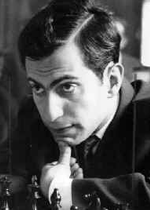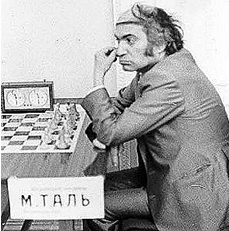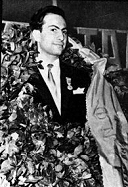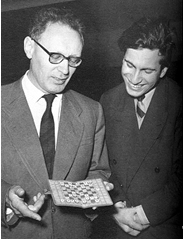Tal Mikhail Nehemyevich (09.11.1936 – 28.06.1992)
 Soviet Grandmaster (1957) born in Riga and like other great champions, was also an honoured Sport Master by the Soviet authorities. The eighth World Champion, he began to play chess at the age of 10. He studied chess, being coached by Koblencs at the Pioneer Palace, Riga. At 18, he received the Master title and three years later in Moscow, he won the USSR Championship to become a Grandmaster. The play of the young Grandmaster was characterised by his sharp combinative style, the exactness of calculation and risk. He was also the winner of the USSR Championship 1958 and the Interzonal Tournament in Portoroz the same year. In 1959 in the Candidates Tournament in Yugoslavia, he won topping famous opponents like Smyslov, Keres, Petrosyan and Fischer with whom he scored 4-0. Finally in 1960, he got the right to play the title-match against Botvinnik. After a spectacular fight, Tal won the match and became the eighth World Champion. As a World Champion and member of the USSR Team in the Olympiad in Leipzig, he won a golden medal for the best achievement at board 1. The same year, he finished in the International Tournament in Stockholm. In 1961, pressured by the FIDE regulations and Botvinnik, Tal was forced to play a return match. Tal could not stand up against the brilliant and solid play of Botvinnik and finally conceded to him the title. The youngest former World Champion continued his great fighting, but due to bad health and a kidney problem, he could not repeat his earlier success. However, he managed to win a few more tournaments and qualify for another World Championship Candidates’ cycle in 1964. After beating Portisch and Larsen, he lost the right to play Petrosian for the title by losing to Spassky in the finals. Tal won another Soviet Championship in 1967. In 1968, he played the Candidates’ matches successfully with Gligoric but lost to Korchnoi. In 1969, Tal was operated on and one of his kidneys was removed, but nevertheless he continued with chess, struggling with his remaining non-healthy kidney. Unfortunately, despite strong warnings, he was still drinking and smoking heavily. He did well in the 1972 USSR Championship when he finished first (+9=12), in 1974 he came in equal first with Beliavsky with a score +6=7-2 and in 1978, shared the first place with Tseshkovsky. Also, he achieved some outstanding victories in Tallinn 1971, 1973, Wijk aan Zee 1973, Halle 1974, Leningrad 1977, Riga Interzonal 1979, Riga 1981, Sochi 1982 and Termes de Rio Hondo 1987. He was equal first in Montreal 1979 with Karpov, Moscow 1982 with Vaganian, Tallinn 1983 with Vaganian, Yurmala 1985 with Gurevich, Tbilisi 1986 with Azmaiparashvili and Yurmala 1987 with Gipslis, Psakhis and Razuvaev. In 1980, he lost the first round of the Candidates’ to Polugaevsky and a play-off vs Timman in 1985. He was the winner of many international team tournaments; as a member of the USSR Team, he won the Olympiads eight times, the European Team Championship six times and the World Student Team Championship three times. He participated in the two 1970 and 1984 matches organised between USSR and the Rest of the World. In 1988, he won his last world title by becoming the World Champion at the rapid game in St. John, Canada, topping Kasparov and Karpov. Playing until the end of his life, he won his last game in a blitz tournament in Moscow against…G. Kasparov. In the summer of 1992, he passed away when he was only 55. His chess creativity was developed from a sharp combinational style up to universal. His play was characterised by the depth of his ideas, high technical skill and capability to carry out his solid strategic plans. The Canadian Professor Divinsky said: “Tal had a wild combinative instinct and hair-raising style, and he was quick, confident, aggressive and delighted in sacrifices that might not be altogether sound but were full of fathomless complexities.” Matanovic said: “Tal accepted the admiration and attachment of the chess fans and repaid them by playing creative chess, introducing new ideas, and he became famous for his willingness to take risks. He remained devoted to chess and his fans. Those people who had the privilege to know him as a person will remember Mikhail Tal as an intelligent, witty, broad-minded man and a fair player. His brilliant games will be remembered by those who knew him as well as by future generations.” Being a talented and productive journalist in the period 1960-70, he was the editor of the Latvian chess magazine Sahs, and some materials written by him were completed and published in English as Life and Games of Mikhail Tal (1976). Tal-Botvinnik 1960- Match for the World Championship (1970), Schachtraining with Exweltmeister Tal (1978), Tal’s Winning Chess Combination (1978), Study Chess with Tal (1981). Main chess results:
Soviet Grandmaster (1957) born in Riga and like other great champions, was also an honoured Sport Master by the Soviet authorities. The eighth World Champion, he began to play chess at the age of 10. He studied chess, being coached by Koblencs at the Pioneer Palace, Riga. At 18, he received the Master title and three years later in Moscow, he won the USSR Championship to become a Grandmaster. The play of the young Grandmaster was characterised by his sharp combinative style, the exactness of calculation and risk. He was also the winner of the USSR Championship 1958 and the Interzonal Tournament in Portoroz the same year. In 1959 in the Candidates Tournament in Yugoslavia, he won topping famous opponents like Smyslov, Keres, Petrosyan and Fischer with whom he scored 4-0. Finally in 1960, he got the right to play the title-match against Botvinnik. After a spectacular fight, Tal won the match and became the eighth World Champion. As a World Champion and member of the USSR Team in the Olympiad in Leipzig, he won a golden medal for the best achievement at board 1. The same year, he finished in the International Tournament in Stockholm. In 1961, pressured by the FIDE regulations and Botvinnik, Tal was forced to play a return match. Tal could not stand up against the brilliant and solid play of Botvinnik and finally conceded to him the title. The youngest former World Champion continued his great fighting, but due to bad health and a kidney problem, he could not repeat his earlier success. However, he managed to win a few more tournaments and qualify for another World Championship Candidates’ cycle in 1964. After beating Portisch and Larsen, he lost the right to play Petrosian for the title by losing to Spassky in the finals. Tal won another Soviet Championship in 1967. In 1968, he played the Candidates’ matches successfully with Gligoric but lost to Korchnoi. In 1969, Tal was operated on and one of his kidneys was removed, but nevertheless he continued with chess, struggling with his remaining non-healthy kidney. Unfortunately, despite strong warnings, he was still drinking and smoking heavily. He did well in the 1972 USSR Championship when he finished first (+9=12), in 1974 he came in equal first with Beliavsky with a score +6=7-2 and in 1978, shared the first place with Tseshkovsky. Also, he achieved some outstanding victories in Tallinn 1971, 1973, Wijk aan Zee 1973, Halle 1974, Leningrad 1977, Riga Interzonal 1979, Riga 1981, Sochi 1982 and Termes de Rio Hondo 1987. He was equal first in Montreal 1979 with Karpov, Moscow 1982 with Vaganian, Tallinn 1983 with Vaganian, Yurmala 1985 with Gurevich, Tbilisi 1986 with Azmaiparashvili and Yurmala 1987 with Gipslis, Psakhis and Razuvaev. In 1980, he lost the first round of the Candidates’ to Polugaevsky and a play-off vs Timman in 1985. He was the winner of many international team tournaments; as a member of the USSR Team, he won the Olympiads eight times, the European Team Championship six times and the World Student Team Championship three times. He participated in the two 1970 and 1984 matches organised between USSR and the Rest of the World. In 1988, he won his last world title by becoming the World Champion at the rapid game in St. John, Canada, topping Kasparov and Karpov. Playing until the end of his life, he won his last game in a blitz tournament in Moscow against…G. Kasparov. In the summer of 1992, he passed away when he was only 55. His chess creativity was developed from a sharp combinational style up to universal. His play was characterised by the depth of his ideas, high technical skill and capability to carry out his solid strategic plans. The Canadian Professor Divinsky said: “Tal had a wild combinative instinct and hair-raising style, and he was quick, confident, aggressive and delighted in sacrifices that might not be altogether sound but were full of fathomless complexities.” Matanovic said: “Tal accepted the admiration and attachment of the chess fans and repaid them by playing creative chess, introducing new ideas, and he became famous for his willingness to take risks. He remained devoted to chess and his fans. Those people who had the privilege to know him as a person will remember Mikhail Tal as an intelligent, witty, broad-minded man and a fair player. His brilliant games will be remembered by those who knew him as well as by future generations.” Being a talented and productive journalist in the period 1960-70, he was the editor of the Latvian chess magazine Sahs, and some materials written by him were completed and published in English as Life and Games of Mikhail Tal (1976). Tal-Botvinnik 1960- Match for the World Championship (1970), Schachtraining with Exweltmeister Tal (1978), Tal’s Winning Chess Combination (1978), Study Chess with Tal (1981). Main chess results:
|
Champion, opponent |
Venue, year |
Results |
|
Tal- Botvinnik |
Moscow, 1960 |
+6-2=13 |
|
Tal- Botvinnik |
Moscow, 1961 |
+5-10=6 |
Latvian Championship – 1st; 1957, 1958 USSR Championship -1st, 1958 Portoroz – 1st; 1959 Zurich – 1st; 1959 Bled-Zagreb-Belgrade – 1st; 1961 Bled – 1st; 1961 Stockholm – 1st; 1962, 1964, 1967, 1971 USSR Championship – 2nd; 3rd; 1st; 2nd; 1963 Miskolc – 1st; 1964 Hastings- 1st; 1964 Reykjavik- 1st; 1964 Kislovodsk- 1st; 1964 Amsterdam – 1st;, 1965 beat Larsen for the Candidates 5½-4½, lost to Spassky for the candidates 4-7, 1966 Sarajevo- 1st; 1966 Palma de Mallorca- 1st; 1967 Kharkov – 1st; 1968 Gori- 1st;, 1969 Tbilisi – 1st; 1970 and 1988 World Blitz Championship- 2nd and 1st; 1971 Tallinn – 1st ; 1972 Sukhumi- 1st; 1972, 1974, 1978 USSR Championship – 1st; 1973 Wijk aan Zee – 1st; 1973 Dubna- 1st; 1973 Tallinn – 1st; 1973 Sochi- 1st; 1974 Hastings- 1st; 1974 Lublin- 1st; 1974 Novi Sad- 1st; 1974 Halle – 1st; 1975 USSR Championship- 2nd; 1977 Leningrad – 1st; 1977 Tallinn- 1st; 1977 Sochi- 1st; 1979 Malaga- 1st, 1979 Montreal – 1st; 1979, 1981 Riga – 1st; 1981 Lvov- 1st; 1981/82 Porz – 1st; 1982 Moscow – 1st; 1982 Sochi – 1st; 1982 Köln-Portz – 1st; 1982 Yerevan- 1st; 1983 Tallinn – 1st; 1984 Albena- 1st;, 1985, 1987 Yurmala – 1st; 1985 Montpellier – 4th; 1985 Taxco-3rd; 1986 Tbilisi – 1st; 1986 West Berlin- 1st; 1987 Subotica- 4th; 1987 Termes de Rio Hondo – 1st; 1987, 1988 Reykjavik- 2nd; 3rd. In 1960, he won the World Championship final match against Botvinnik; in 1965 won the Candidates’ match against Portisch 5½-2½; in 1968 lost a match to Korchnoi 4½-5½; the same year he beat Gligoric 5½-3½; in 1969 he lost to Larsen; 1980 lost the quarterfinal match to Polugaevsky 2½ : 5½; in 1985 he drew the Candidates’ tie-break match against Timman 3-3; finally in 1988, won a friendly match vs Timman 3½-2½ in Holland.






